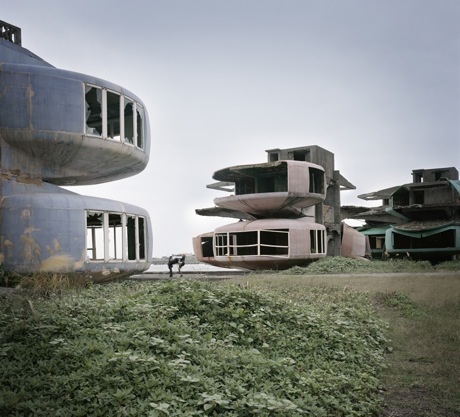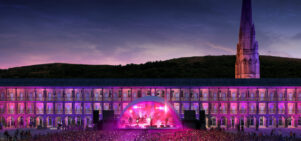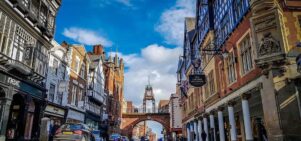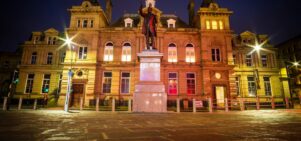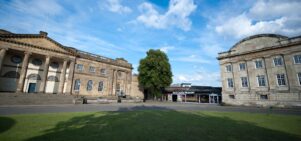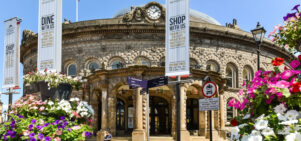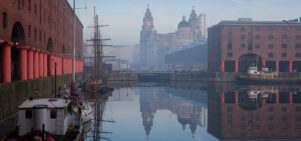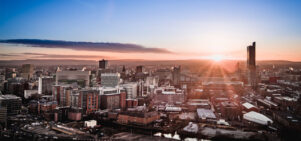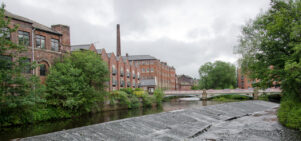Unfinished business.
Kate Feld
Kate Feld reviews Stanley Wong’s solo exhibition at Chinese Arts Centre
In the late nineties, artist Stanley Wong often stayed in a hotel in Guangzhou whose rooms offered an unusual view: it was right next to a tall building that had been abandoned just weeks before completion. Whenever he stayed there, Wong would find himself staring out of the window, admiring its stark, postmodern lines and wondering what had happened.
Over the next few years, as the country’s economy slowed and the frenzied property market began to collapse, Wong started to see more of these abandoned building projects in China. They became known as lan wei – decaying ends, buildings inexplicably aborted before completion, their owners overextended or mired in shady business dealings. In Hainan alone, some 16.3 million square meters of building space was left unfinished in 1998. And as the bust spread out across Asia, so did the lan wei. They seemed to say something compelling about society, so Wong began a project focused around them. He started with the building that had noticed first, photographing it and trying to uncover its full story.
“I was asking around in the neighbourhood, ‘why did they stop?’ Most people didn’t want to talk about the building,” Wong recalled. “In the end, one person told me that the guy who owned it comitted suicide by jumping from it, because of the corruption.” It’s the first image we see in Wong’s exhibition at the Chinese Arts Centre: a monolithic grey grid, with the sky behind visible through a few windows.
The exhibition is full of images like these from around Asia, taken during a five-year project where Wong researched, found and shot unfinished buildings. The photographs are oddly compelling, showing interiors stripped of context and identity, reduced to bare planes of concrete. For Wong, the buildings are more than potent warnings against the dangers of getting swept up in the chase for money and power. “They say that everything can be aborted, actually – a relationship, a meeting, a project – when it comes to two people or more, anything can end suddenly.”
Eventually, as his thinking about the lan wei evolved, Wong began staging photographs inside the buildings to make more pointed statements. “I wanted to persuade people to consider human values,” he said. In one, an older woman sits serenely on a tiny rocking horse, the skyline visible behind her – a comment, he explains, on the way we remember our childhood in old age. In another a man sits on an old safe, a tangle of reciept tape unspooled at his feet, while above his head hangs a framed piece of Chinese calligraphy, an invocation of good fortune in trade traditionally given to new business owners.
Some of the most striking images here are from a futuristic, never-completed resort in Taiwan called Golden Mountain. Its fantastic space-age structures, resembling pastel pods on stalks, sat unfinished for 27 years, buckling and rusting. In one photograph, two women are fighting, their limbs a blur; in another a single woman leaps gracefully through the air. It’s a comment, Wong says, on what he sees as the strange contradictions inherent in the Taiwanese character.
The last series offers a sense of evolution. Taken in Thailand, the pictures feature illegal workers living in the lan wei that have become their homes. A couple of young men relax in the vast expanse of an unfinished floor, a bird in a wicker cage nearby. Two women, one standing with crutches and one lounging against a gigantic old-fashioned television, stare dreamily in opposite directions. Though their lives are hard, the squatters are happy, Wong says – and he sees their residence in the lan wei as proof that every dead end holds within it the possibility of a new beginning.
“I’m really optimistic about society – that’s the ultimate statement I want to make,” Wong says. “Life goes on.” And you never know what will happen. Against all expectation, the first building he photographed, the one near the hotel in Guangzhou, has just been completed.
Lan Wei/Decaying End is on until 12 June at Chinese Arts Centre. Free entry. Images (top to bottom): Lanwei 24/Live life 3/Three girls/Bangkok, Thailand (2008); Lanwei 19/The beasts/Taipei, Taiwan (2006), both anothermountainman (Stanley Wong), courtesy the artist.


